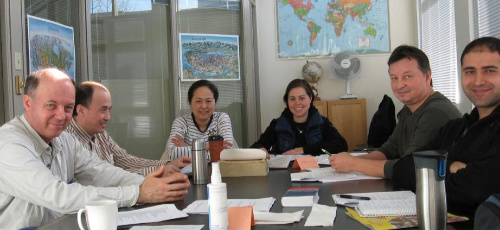
Students at the ESL Conversation Program. Photo from UBC Learning Exchange UBC-Community Learning Initiative Annual Update 2010-2011.
This story first appeared in the UBC Learning Exchange UBC-Community Learning Initiative Annual Update 2010-2011. For this and other stories, visit the UBC Learning Exchange site.
The ESL Conversation Program supported by HSBC Bank Canada has two core goals: to offer effective language practice to Canadian immigrants and citizens; and to develop the capacities of Downtown Eastside volunteers who facilitate the sessions. While the program continues to be overwhelmingly popular and successful—with hundreds of learners and up to 30 volunteer facilitators in a typical term— it also continues to explore new possibilities and develop in new directions.
For example, an exciting initiative last year was the establishment of ‘curriculum development committees’ which brought together over 30 ESL learners and ESL facilitators to co-create curriculum resources tailored to both learner and facilitator needs and interests. This effort was supported by a part-time UBC staff member who engaged people in developing the initiative, resulting in the creation of lessons for beginner and intermediate levels. Due to the success of the experience and strong participant turnout, the committees continue to work together on developing lesson materials for advanced ESL learners. The improved lesson materials are available to other organizations and, in one case, another community organization adopted the lesson-planning model, recognizing its power to engage and stimulate learning and cooperation. This participatory project demonstrates how social sustainability is strengthened when people work together to achieve shared goals.
Also last year, at the suggestion of a volunteer, an ESL Creative Writing group was established and has also surpassed expectations. A public reading of writing pieces at the Learning Exchange generated enough interest and praise to lead to plans to stage a reading of works in this year’s Heart of the City Festival, and to involvement of UBC Creative Writing students in further developing the writing group. These initiatives are examples of how the Learning Exchange is bringing people together—people who might not otherwise work together—tapping into previously unacknowledged talent and creating new results.
Learning Can Take UBC Students By Surprise
There’s a learning opportunity in every experience—a chance to grow, to think differently about the world around us, our community and the people who live in it, even about ourselves. For Deborah Chen, a fourth year UBC undergraduate student in Medical Laboratory Science, this proved true, when in her third year Deborah volunteered at the Learning Exchange to assist with the ESL conversation program and found she learned as much about herself as she did about others.
Years earlier, an ESL student herself, Deborah understood the challenges faced by ESL learners when she acknowledged “how difficult it was for me to overcome my [language] fears.” Initially, Deborah was part of a small group session with participants practicing their English through conversation, discussing topics such as life in Vancouver and favourite holidays. Through that class, Deborah met George—a keenly motivated surgeon from China trying to pass English exams to qualify him as a surgeon in Canada. They began working together at the Learning Exchange, practicing medical terminology and mock interviews. Deborah then further expanded her role, facilitating a larger group session for English language beginners—a totally different experience. “Being able to facilitate the learning process is a very rewarding process… [The learners] progress is your reward, and another way of giving back to the community,” which Deborah calls “a place of exchange.”
There were many things Deborah found rewarding about working with ESL learners. “It was the interactions and the experiences and the way [the learners] indirectly teach you about life, themselves and their culture,” says Deborah, adding that their stories, the hardships they faced and how they tackled those hardships really rang true for her. Deborah acknowledged that facilitating is challenging, but says it was “an opportunity to teach, and an opportunity to learn how to teach,” including the need to be creative and adaptable. Through facilitating, she also came to better appreciate the value of her own education, seeing the enthusiasm of the ESL session participants. “They are doing this for free,” said Deborah, “and they are so eager to learn. Whereas I am paying for my education. And sometimes you see people falling asleep or on their phones [during class] … I’ve learned the intrinsic value of learning, which was a really big lesson for me.”
